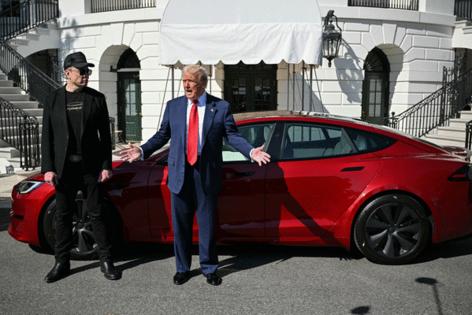Trump's dangerous war on information
Published in Political News
As an economist, I know that information is key to our free-market system. If a business makes a good product sold at a fair price, it makes a profit. If it sells an inferior product or charges more than competitors, buyers turn away. Businesses must be responsive to consumer demands.
A democratic political system operates similarly. In this case voters act as consumers, providing positive or negative feedback to politicians, who adjust their conduct accordingly. But today, voters are not getting the information they need to make informed choices.
Having worked for the federal government under both Republican and Democratic presidents, I’ve had a front-row seat to policy swings between administrations. This time, what’s happening is different: The Trump administration is using a wide range of tools to block, limit or distort the flow of information that would otherwise serve as feedback to voters.
The administration has shuttered multiple government information websites, including the Center for Disease Control and Prevention’s disease outbreak tracker. It barred the Associated Press from the White House press room for not recognizing the “Gulf of America.” Defense Secretary Pete Hegseth expelled legacy media, including NBC News, The New York Times, National Public Radio and Politico, from the Pentagon press room in favor of primarily conservative outlets. Trump fired 18 inspectors general, who served as independent watchdogs that uncover waste, fraud and abuse at federal agencies.
Trump has deployed lawsuits and regulatory actions against media entities that sometimes report unfavorable news, suing ABC, CBS owner Paramount, The Des Moines Register and the Pulitzer Prize Board for honoring journalists covering Trump’s 2016 campaign. Trump previously sued Facebook parent Meta for blocking him after the Capitol riot and CNN for defamation.
In February, Brendan Carr, head of the Federal Communications Commission, announced investigations of NBC, ABC, CBS, PBS, NPR and KCBS radio over what he claims is biased content. Elon Musk is suing Media Matters for America, a nonprofit that tracks extremism in the media. For both Trump and Musk, the goal is not necessarily to win cases, but to hobble and intimidate independent news sources.
When President Donald Trump speaks, he is often untruthful, and it is the media’s job to point that out. But Trump wants to impede that function as much as possible. Early in Trump’s first term, adviser Kellyanne Conway coined the phrase “alternative facts” regarding situations that called for falsehoods. The Washington Post’s fact-checker team documented more than 30,000 false or misleading claims made by Trump during that term.
This time around, Trump is demanding loyalty on key untruths. Candidates for national security positions must say “yes” when asked whether the 2020 election was stolen. Vice President JD Vance complained about fact-checking during the vice-presidential debate when he falsely claimed that Haitian immigrants were eating neighbors’ pets. He justified this falsehood as a way to bring attention to the border issue.
Finally, Trump and Musk are using their bully pulpits on social media to disparage disfavored outlets. Musk falsely accused Reuters news service of “social deception” after it reported that his federal government cuts are based more on political ideology than cost savings.
In the face of criticism and financial pressures some embattled media companies, including The Washington Post and the Los Angeles Times, preemptively capitulated by withholding endorsements of Kamala Harris. Meanwhile, ABC News agreed to pay $15 million to settle a defamation suit they would likely have won. And social media platforms like Facebook and X have pulled back on fact-checking initiatives.
Autocratic politicians depend on their ability to lie without facing accountability. Elections based on disinformation may not reflect true voter preferences. Thus, it is not just important but patriotic to use fact-checking websites to verify claims, avoid relying on one type of media and learn how to recognize misinformation. Voters can also financially support groups that conduct investigative journalism or advocate for press freedom.
For their part, media company owners must recognize that preemptive capitulation to nuisance lawsuits and bully pulpit harassment encourages such behavior. If we don’t protect our First Amendment rights, an increasingly constricted information environment will lead to an echo chamber society ripe for manipulation by leaders who promise simple answers to complex issues.
____
Keith Kozloff is an economist whose career included policy positions in government, private and nonprofit sectors. He lives outside of Washington, D.C. This column was produced for Progressive Perspectives, a project of The Progressive magazine, and distributed by Tribune News Service.
____
©2025 Tribune Content Agency, LLC.




























































Comments